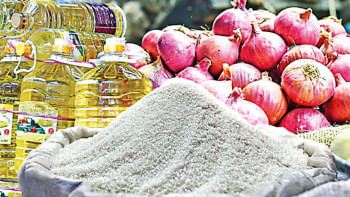Will fixing prices of daily essentials work?

The commerce ministry's decision to fix the prices of nine commodities has, perhaps justifiably, met with guarded optimism. While some consider it a step in the right direction, given constant fluctuations in prices and their uncontrollably upward movement over the last few months, others have cast doubt over the rationality and effectiveness of such a move. But there is no doubt that existing strategies are not working. A stronger intervention is needed. Whether artificially setting prices is the right way to go is the question.
The latest decision comes amid concerns that people are not getting the benefit of reduced prices of some goods in the global market, and are being charged exorbitantly high even for a miniscule increase in international prices.
According to media reports, the ministry has cited price manipulation by unscrupulous traders as the reason for choosing to determine the prices of nine commodities – including rice, lentil, flour, atta and onion as well as mild steel products and cement – within 15 days. Already, Bangladesh Trade and Tariff Commission (BTTC) fixes the prices of edible oil and sugar after periodic market reviews. It will follow the same pricing method for the remaining commodities. Anyone charging more than the fixed prices will reportedly not only be fined but also sued.
Credible doubts, however, remain over the ability of the government to monitor the market for potential breaches of the price-cap regulation or to impose said punishment. Our experience with previous attempts to check hoarding and overpricing or fine dishonest traders leaves little room for hope. Such raids were too few and too uncoordinated to have an impact on prices. Also, unlike some imported goods such as edible oil and sugar, it will be difficult to fix the prices of commodities like rice "because of wide varieties of the staple and the fact that the government does not have the exact data on its production and stock," as per an expert. This, he said, could lead to a supply crunch, causing further problems. He suggested that the government should rather strengthen market monitoring to keep prices stable.
However, stability will mean nothing if the bar at which prices are presently set remains high. The latest decision comes amid concerns that people are not getting the benefit of reduced prices of some goods in the global market, and are being charged exorbitantly high even for a miniscule increase in international prices. According to the Trading Corporation of Bangladesh, in the past one month, the prices of rice have increased by up to 15.13 percent, the price of atta increased by up to 28 percent, and the price of sugar rose by nearly 10 percent. All other commodities have also seen a similar pattern of price increase, despite various efforts from the government to bring it down.
Clearly, we need drastic action. But the government must also be judicious, proactive and firm in pursuing its policies and ensure that all relevant agencies and ministries work in collaboration for a bigger impact.

 For all latest news, follow The Daily Star's Google News channel.
For all latest news, follow The Daily Star's Google News channel. 





Comments